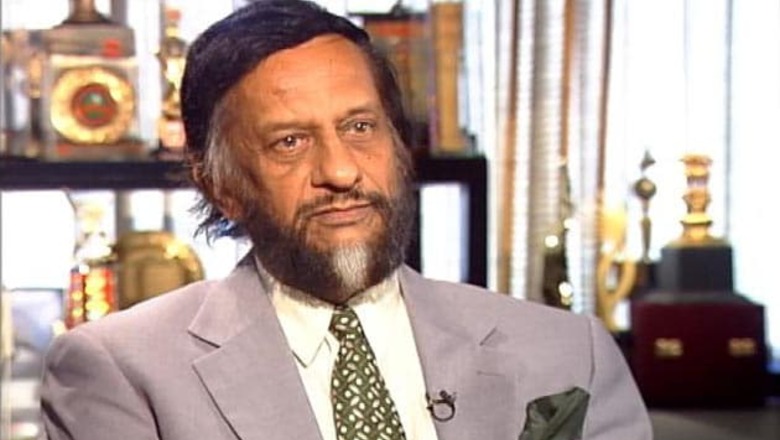
views
United Nations: A UN-ordered probe into the working of the R K Pachauri-led IPCC has suggested that the body initiate a comprehensive reform of its structure to prevent errors in its analysis like the ones in its 2007 reports on the melting of Himalayan glaciers.
The report by the Inter Academy Council (IAC) found that the erroneous conclusions drawn by the UN climate panel were a result of the failure of its review process to examine existing scientific literature and take into account review comments by experts.
The International Governmental Panel on Climate Change (IPCC) came under heavy criticism after it was found that its report spelling out that the Himalayan glaciers were likely to disappear by 2035 was an exaggerated claim.
The probe into the working of the IPCC was requested by the UN and the panel itself, following the criticisms over its reports on the impact of global warming on the Himalayan glaciers.
"Failure of the authors to carefully consider thoughtful review comments.... which would have improved the quality of the report," the IAC said was a prime reason for the errors in the IPCC report.
Additionally, the failure of review editors to ensure that "reviewer comments were adequately addressed and that controversies are reflected adequately in the text of the report" was another critical lacunae, it said.
This also led to "insufficient evaluation of non-peer-reviewed literature by the Lead Authors," the report released today said.
The report suggested a fundamental reform in the climate panel's structure, including appointing of an executive director to be at the helm of its affairs.
It said the current position of the IPCC secretary does not carry a level of autonomy or responsibility equivalent to that of executive directors at other organisations.
Therefore, IPCC also should appoint an executive director "with the status of a senior scientist equal to that of the Working Group co-chairs to lead the Secretariat, handle day-to-day operations, and speak on behalf of the organisation," it said in its recommendations to fortify IPCC's management structure.
It also said that the body's chairman should be changed with every review.
Pachauri said the recommendations, including that chairman should be changed with every review, will be debated by its member nations which will subsequently take a decision on whether he should step down in line with this arrangement.
"This will be debated by all the governments of the world and they will decide what is to be implemented and when it is implemented," Pachauri told media persons.
The recommendations also included the suggestion of establishing an executive committee to act on the Panel's behalf and ensure that an ongoing decision-making capability is maintained.
"To enhance its credibility and independence, the executive committee should include individuals from outside the IPCC or even outside the climate science community," it said.
It also said a rigorous conflict-of-interest policy should be applied to senior IPCC leadership and all authors, review editors, and staff responsible for report content.
The InterAcademy, founded in 2002, assembles leading scientists and engineers from all nations to provide peer-reviewed advice to international bodies.
The InterAcademy has, previously, produced two reports for the UN.
The investigation into the working methods of the IPCC was set up in March following the discovery of exaggerated claims in the fourth report of the scientific body.
The findings on the Himalayas was one of the most cited with respect to errors.
"Glaciers in the Himalayas are receding faster than in any other part of the world and if the present rate continues, the likelihood of them disappearing by the year 2035 and perhaps sooner is very high if the Earth keeps warming at the current rate.
"Its total area will likely shrink from the present 500,000 to 100,000 (km sq) by the year 2035," the IPCC 2007 report had said.
IAC found that the six experts that reviewed the first draft of this section did not make any critical comments, and despite a couple of comments questioning sections of the second draft, it was not changed.
One critical reviewer, David Saltz from the Ben Gurion University, wrote then, "100,000? You just said that it will disappear".
Another sceptical reviewer, Hayley Fowler from Newcastle University wrote, "I am not sure this is true for the very large Karakoram glaciers in the Western Himalayas".
Hewitt (2005) suggested from measurements that these are expanding -- and this would certainly be explained by climatic changes in precipitation and temperature trends seen in Karakoram region.
The IAC noted that "had the authors and/or review editors consulted the references, they would have found two peer-reviewed articles, which at the very least, were more cautious about the disappearance of the Himalayan Glaciers".
Acknowledging that while reform of the IPCC was essential, Pachauri, stressed that there were no doubts about fundamental truths of the climate science.
"Climate Change is real," he said, speaking after the release of the IAC probe-report at the UN headquarters.
"This is not to say that IPCC cannot improve. It can and it will".
Noting that the IPCC had not yet reviewed the IAC report, Pachauri did not offer specific comments on its findings.
The IPCC chief, however, cited several sources that underlined the authenticity of the IPCC's work, including the Dutch Environmental Assessment Agency.
"Overall the summary conclusions are considered well-founded and none were found to contain any significant errors".
The US Environmental Protection Agency concluded that, "climate science is credible, compelling and growing stronger," Pachauri said.
The Indian scientist also said that some of the criticism against the IPCC had been driven by climate sceptics for ideological reasons.
"We also have to remember that honest scientific discourse wilts under gross distortions and ideologically driven posturing. Sadly, such tactics have been a prominent feature of climate science for many years and they show no signs of letting up," he said.














Comments
0 comment